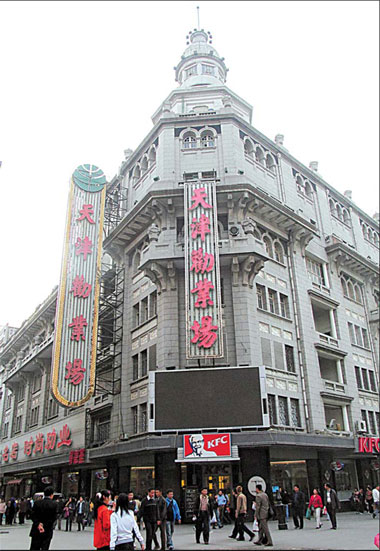|
|

Quanyechang shopping mall is an iconic building in Tianjin's business center. Liu Zhaoming |
American Billy Morrison loves living in what he calls "the biggest village in China". And he has no plans to leave Tianjin - China's third-largest municipal area, home to 10.43 million permanent residents and host to a small, but largely devoted, expat community.
After first coming to Guangdong province's capital Guangzhou when he relocated to China five years ago, the Texan found Tianjin had an allure he simply couldn't resist. So he moved there three years later and his infatuation with the place has blossomed into true love.
"Life is good here," he says between sips of beer as he leans back in a chair outside Scooter's Bar. Today, the former professional motorbike racer manages the motorcycle-themed nightspot for his father on the city's main bar strip Youli Lu.
"And business is good here, too," he adds, smiling.
|

Tianjin is now home to a small but devoted expat community. (From top) Tomas Berena from Spain, Lyudmila Kovalik from Ukraine, Jordan Violaris from Cyprus and Natia Kaikatsishvili from Georgia. Photos by Erik Nilsson |
Morrison has joined the ranks of a "really tight group" of expatriates in Tianjin who call themselves "TJ Lifers".
For them, the city's pull is that it offers the many amenities of larger metropolises - but certainly not all of them - without many of the drawbacks of big city life.
"You get the best of both worlds," Morrison says. "It's foreigner-friendly, but you still get a small-town feel."
In other words, while "everybody knows everybody" and the pace of life is slower than in larger Chinese cities, he says he can still easily find comforts like Western chow.
But as Georgian Natia Kaikatsishvili points out, even some of the inconveniences of living in Tianjin have upsides.
"Not many people in Tianjin speak English, so it's easier to learn Chinese. (Otherwise) it's very difficult to get around," she says.
The 23-year-old Chinese-language student believes living in Tianjin has helped her learn the language faster than she would have in any of the country's other big cities.
And the fact that it's also less expensive is a boon for those scraping by on a student budget, she says.
In addition to the language-learning perks, it's easier to engage with the local culture in Tianjin than in other cities, Kaikatsishvili adds.
"Chinese people here like to make friends with us. If we walk around campus, they'll come up to us and ask where we come from and if they can have our phone numbers," she says.
Finn Pekka Jouttla, who has lived in the city for half a year, explains that meeting locals is easier in Tianjin than it is in the capital, while meeting expats is harder.
"In Beijing, you're just another expat among others, while here, people still look at you with curiosity," he says.
"In Beijing, it's easier to find expat things because there's already that expat culture in place."
Jordan Violaris, of Cyprus, says this is one of his favorite things about living in the municipality.
"It's different from other cities in that it's warmer-hearted," he says.
And while the smaller foreign community makes it more difficult for expats to meet one another, its size also has advantages, the 21-year-old Chinese-language student says.
"The foreigners in Tianjin all know each other," he says. "In other big cities, it's just too big for that to happen."
In addition to size, it's the nature of what brings foreigners to bigger cities that makes their expat communities less cohesive, Kaikatsishvili believes.
"Almost everyone in Beijing and Shanghai are mostly in these cities because they are doing business, so they are maybe more distant," she says. "Maybe they're not so interested in making friends, because they are too busy and don't have time."
Ukrainian Lyudmila Kovalik, however, says she has found life difficult in Tianjin. The 21-year-old student believes meeting expats helps her cope with loneliness.
For Spaniard Tomas Berena, who works in an international wind turbine-manufacturing firm, it's Tianjin's bedlam that he likes most.
"We have a Spanish saying that goes something like, 'order within disorder'. That fits Tianjin," he says.
Berena, who has lived in the city for five months, has traveled around China for years, and he says it's exactly this pandemonium that sets the city apart from others he's visited.
"While the city's more chaotic, the people are more relaxed than in maybe Shanghai or Beijing," he says.
"I'm glad Beijing is so close but I could never live there. This is more rugged."
As Finn Antti Peltolahti, who has worked as an engineer in the city for half a year, puts it: "Beijing and Tianjin are very close. But Beijing is more like Europe, while Tianjin is more like Russia."
And with all of its pluses and minuses, for some foreigners living in China, Tianjin is the only place to be.
"I was in Shanghai for 20 days, and I don't think I'll go back there," Kaikatsishvili says.
"If I stay in China, I'll live in Tianjin."
(China Daily 10/17/2008 page19) |

